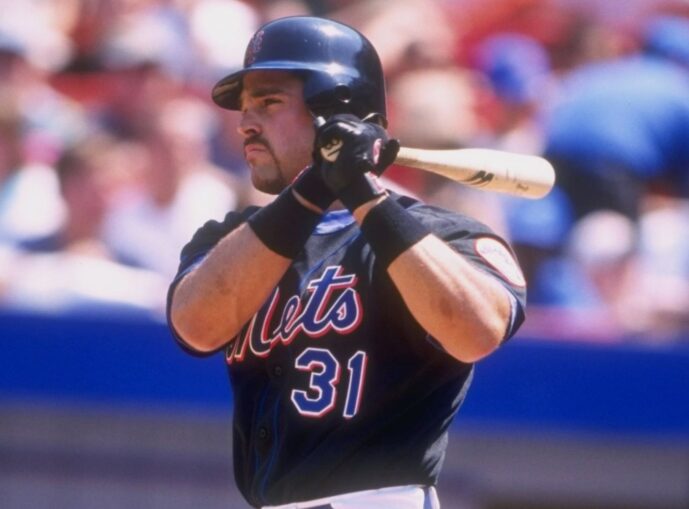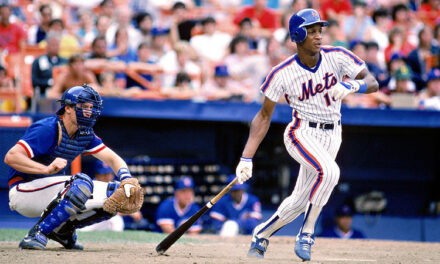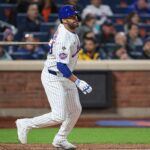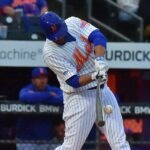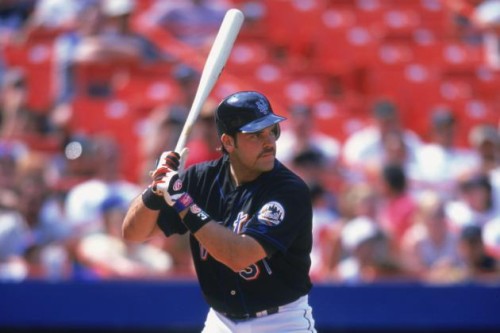
Mike Piazza’s journey of going from a 62nd-round draft pick (1,390th overall) at the behest of a Hall of Fame manager, to switching positions late in his teenage years and becoming the greatest hitting catcher of all time is one of near improbability.
For Piazza, 54, baseball was a way of life and something he innately knew he was destined for.
From a young age, Piazza had access to the major leagues as his father, Vince, was good friends with Dodgers’ coach and later Hall of Fame manager, Tommy Lasorda.
Lasorda gave Piazza the opportunity to be batboy on occasion, where Piazza would have the chance to work with players and coaches on his swing. Growing up in Pennsylvania, Piazza spent countless hours training and refining his swing, as his father built him a batting cage in his own backyard.
Piazza’s offensive abilities were evident early on, as one of the greatest hitters the game has ever seen in Ted Williams concurred when paying a visit to a young Piazza at his home while in Pennsylvania for a card show appearance.
After attending the University of Miami and Miami-Dade Community College, Piazza was selected by the Dodgers in the 62nd round of the 1988 Draft due to a recommendation by Lasorda.
Having previously played first base in junior college, the Dodgers decided to convert him to catcher, as that position would give him a greater chance of reaching the majors due to his offensive profile.
The slugging right-handed hitter made his presence known in his rookie season of 1993, when he hit 35 home runs, drove in 112 runs and posted a 153 OPS+ en route to unanimously winning the N.L. Rookie of the Year Award. He became the first National League rookie to hit 35+ home runs and post an OPS+ of at least 150, with only Albert Pujols (2001) joining that list since.
Piazza quickly became one of the more prolific and clutch power hitters in the sport. From his rookie season of 1993 through the 1997 season, Piazza was tied with Mark McGwire for the 11th-most home runs in the majors (167), and posted the fifth-highest wRC+ among qualified hitters with a 162 mark.
While Piazza’s stardom continued to rise, tensions grew between the All-Star catcher and the Dodgers organization in regards to a new contract. On May 14, 1998, the Dodgers traded Piazza along with Todd Zeile to the defending World Champion Florida Marlins for five players, which included Charles Johnson, Bobby Bonilla and Gary Sheffield.
A mere eight days later, Piazza was on the move yet again in what became a defining day in New York Mets history. The club acquired Piazza from the Marlins in exchange for Preston Wilson, Ed Yarnall and Geoff Goetz.
In 109 games with the Mets in ’98, Piazza slashed .348/.417/.607 with 56 extra-base hits and 76 RBI. Piazza’s 168 wRC+ is the highest single-season mark in Mets history (min. 400 plate appearances).
Acquiring Piazza helped change the outlook and landscape of the Mets organization, giving the club a bonafide superstar in the middle of their lineup. The club rewarded Piazza with a seven-year, $91 million contract after the season, which was the richest deal in major league history at the time.
In his ensuing seven seasons with the Mets, Piazza gave Met fans countless memories, including a go-ahead, 3-run home run in the eighth off Terry Mulholland in the Mets’ 10-run inning against the Atlanta Braves on June 30, 2000, a go-ahead, two-run home run off Steve Karsay in the eighth in the first major sporting event held in New York ten days after the terrorist attacks against the United States on September 11, 2001 and breaking Hall of Famer Carlton Fisk’s record for most home runs hit by a catcher with his 352nd blast as a backstop on May 5, 2004.
Among all time Mets, Piazza ranks first in slugging percentage (.542), second in OPS (.915), third in home runs (220), third in RBI (655) and sixth in fWAR (28.2).
Piazza was enshrined in the Baseball Hall of Fame in his fourth year on the ballot in 2016, receiving 83 percent of the vote. He joined Tom Seaver as the only two players in the Hall of Fame that were enshrined with a Mets cap on their plaque.
The 12-time All-Star is one of fourteen players in major league history with 400+ home runs and a career batting average over .300, and his career 143 OPS+ is the highest among 66 catchers who recorded a minimum of 5,000 plate appearances and played at least sixty percent of their games behind the dish.
This January, Piazza can be seen on a new FOX reality competition show called “Special Forces: World’s Toughest Test,” in which sixteen celebrities endure some of the harshest, most grueling challenges from the playbook of the actual Special Forces selection process.
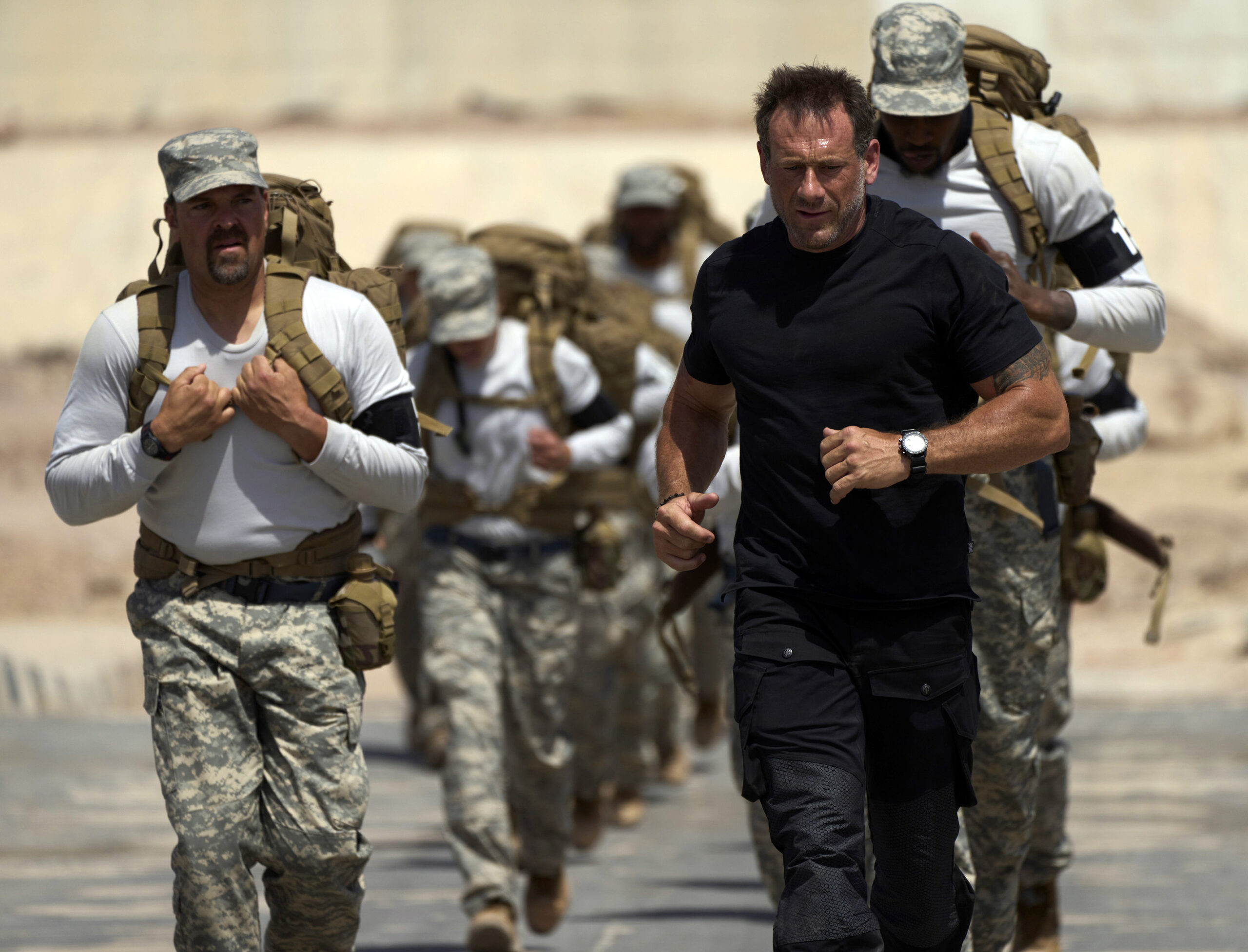
Pete Dadds / FOX
Along with the show, Piazza will also be getting back into the dugout as Team Italy’s manager for the upcoming World Baseball Classic. After representing Italy as a player in the inaugural WBC in 2006, Piazza is eager to help promote the game and showcase some of the younger Italian talent on a big stage.
From Norristown, Pennsylvania, to the hallowed halls of Cooperstown, Piazza’s journey from a late-round pick as a favor to the family to the greatest hitting catcher of all time is one of the greatest examples of resiliency in sports history.
I had the privilege of speaking with Piazza in early December, where he spoke about his early career development, tenure with the Mets and upcoming competition series.
MMO: Where did your love of baseball originate from?
Piazza: Growing up in the seventies was a little different than kids today. They have a lot more distractions with computers and video games. It was just a different time.
We were more into riding bikes, building forts, playing baseball and having pickup games. Going to a baseball game was part of my youth and for a lot of people growing up around the same time.
Growing up in Philly, I was fortunate to watch the great Phillies teams of the seventies; my dad had season tickets. We’d go down and watch [Mike] Schmidt and [Larry] Bowa. I was looking at something online, and that’s what I love about online is that you get to go back and see history with [Greg] Luzinski, [Garry] Maddox and Bake McBride, players and teams I used to watch as a kid. That was something for me.
Right away it was something I always wanted to do. I always wanted to be a baseball player from a very young age.
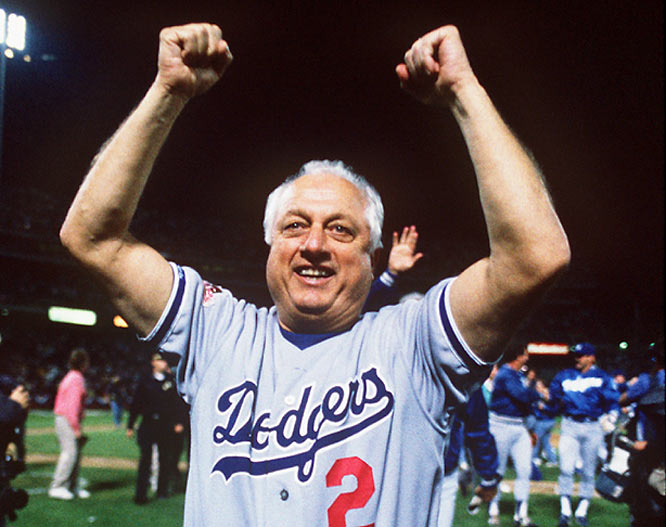
MMO: It’s well-documented how influential and crucial Tommy Lasorda was for your career. What did having Lasorda in your corner mean to you?
Piazza: Tommy was amazing. My dad was a little younger than Tommy, and they basically grew up together. They knew each other in Norristown and Tommy went into baseball and my dad had to do what he had to do. They always remained close.
I remember when Tommy was the third base coach for the Dodgers, I think it was ’76 before he became the manager, my dad would call him over on the third base-side and they’d be talking. And I remember being so very impressed that he knew somebody on the team.
I think I was around twelve when I became batboy, and Mark Cresse was a coach and put me in the cage. I think there was a rain delay and there was a cage underneath the stadium in the tunnel, and I started hitting off Manny Mota and Cresse. Tommy was extremely impressed and at that point knew I had some talent.
It wasn’t a perfect journey. [Laughs.] No journeys to the big leagues are ever easy, but for me, it was interesting.
He was always in my corner. Even when I got older, he’d send me spikes, gloves and equipment. When I went into junior college, he was trying to get me to the right spot where I could develop. Obviously, he convinced the Dodgers to draft me and change positions and the rest is history.
He was everything to me and there’s no question that if it wasn’t for him, I would have probably not made it to the big leagues.
MMO: One of the jaw-dropping moments early in your 2013 autobiography, “Long Shot,” was when you write about the day Ted Williams showed up at your home and watched you take batting practice in your backyard. What do you remember about Williams’ visit to your home?
Piazza: That was an amazing experience. My father was very close with the former Dodgers and Orioles scout Ed Liberatore, and Eddie was very close with Joe DiMaggio and Williams.
There was a card show at the George Washington Motor Lodge in King of Prussia, Pennsylvania, and Ted Williams was there signing autographs. Eddie Libertore was talking with him at breakfast one day and said, “My buddy, Vince, has got a kid. He’s a pretty good hitter and he’s got a cage in his backyard. He practices in his backyard.” And Ted Williams said, “Let’s go see him hit.”
The next thing I know Ted Williams is coming to my house! I didn’t sleep the night I found out, it was an amazing experience. I have to tell you, aside from just the mechanical part of hitting which he was working on and complimented my swing, there was also a lot of mental things that were sort of tattooed in my memory.
It was definitely an inspirational moment, a watershed moment in my career that inspired me to work hard. A lot of the lessons he taught me I still teach today and relay to kids today in my coaching.
MMO: How difficult was the transition going from a first baseman to a catcher in your late teenage years? And you went to the Dodgers’ Dominican academy initially to learn the position, is that right?
Piazza: That’s correct. Look, it was definitely difficult for me. I was fortunate at the time that I had a pretty good arm, and I always threw the ball pretty well. There were times when I was actually pitching at fourteen or fifteen, and Claude Osteen, who was the Phillies’ pitching coach and a former Dodger, saw me pitch and said, “I think Mike could pitch as well.”
I was fortunate to have a decent arm, but to sign as a catcher and really have to convert was really difficult. I was fortunate that I was able to have good coaching, I had Johnny Roseboro and Kevin Kennedy who were my first two catching coaches. They worked with me religiously in blocking balls and throwing and the other intricacies of the position.
One of the first guys that I caught was a guy named Tim Scott, who pitched for the Expos, and was very patient with me. Another guy, Mike Hartley, was in the big leagues for a little bit. I remember these guys were so patient with me and inspired me.
I knew I was raw and had a lot of work to do, but I had great coaches and people in my life that inspired me from Tommy on down. Not everybody was a big fan of course, there were always people that you’re never going to convince, but fortunately, I had the right people in my corner. I was blessed to have them looking out and helping me.
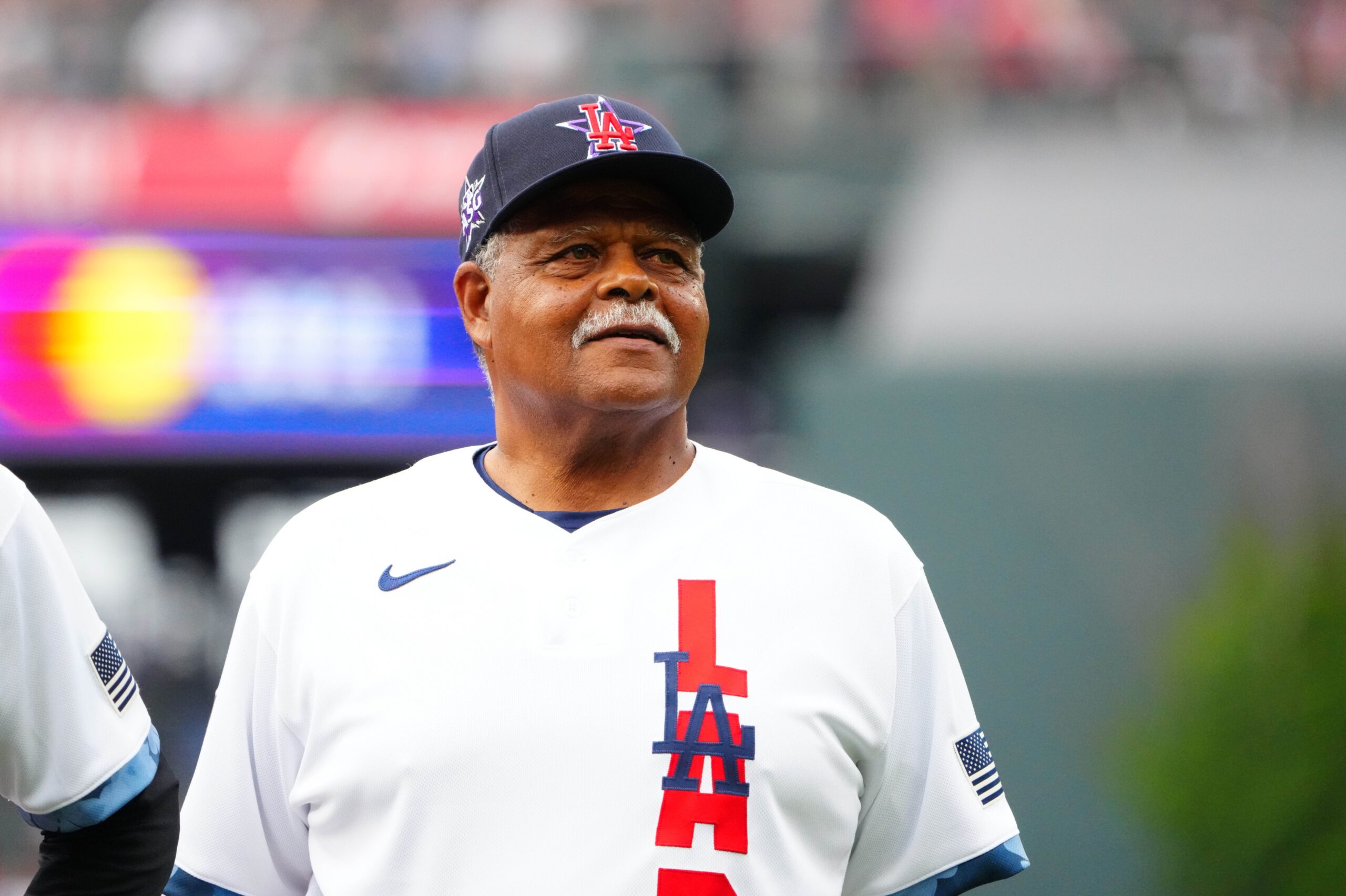
Mark J. Rebilas-USA TODAY Sports
MMO: One of those people who you seemed to have in your corner was coach Reggie Smith, who fought hard for the Dodgers to consider you as a prospect. He was also the one who went to your home to bring you back to Vero Beach after you initially decided to quit baseball. How did Smith aid in your development?
Piazza: I think Reggie and I had some really interesting similarities. We gelled right away with the hitting part and had a connection with Ted Williams; Reggie Smith came up with the Red Sox when Williams was the hitting coach there.
There was a real connection and I think we had the same philosophy. Reggie was able to look at my swing and refine it in a way. He didn’t really change it, but he was able to refine it.
In order to get quicker on the pitch inside, he taught me at the time how to make my swing more compact, more off the hips and not so much of the bat lag. My swing was a little long, and he was able to refine it and taught me some drills that really helped.
When I was having my problems in the Dodgers organization and wasn’t playing a lot and clashing with some of the coaches, they were going to release me. He was in a meeting and they were like, “Piazza, non-prospect. We should release him.” And Reggie was like, “Let me tell you something, you release this guy he’s going to come back to bite you in the butt. He has something you cannot teach. You cannot teach power. You can’t teach power and you can’t teach speed.” He said, “I’m sorry, I just do not recommend releasing a guy that has power.”
They finally relented and gave me a 300-at-bat season and I went to Bakersfield the next year (1991) and hit 29 home runs. That was a turning point in my life.
If it wasn’t for him looking out for me and going to bat for me, pardon the pun, my life would probably be different.
MMO: It’s been well-documented but that eight-day period between May 14, 1998, and May 22, 1998, in which you were traded twice must’ve been a whirlwind for you. What were your initial reactions to being traded to Florida, and then New York eight days later?
Piazza: That was a very interesting time in the game and in my life personally. It was a little bit frustrating being young and coming up with the Dodgers and thinking I would be there my whole career. And then the Dodgers getting sold and for some reasoning that I don’t understand we just clashed.
My contract was up and the Dodgers gave me a two-year deal to get me to free agency because they knew they were selling the team, and then they would wait until the next owners took over.
I don’t know why it was, I have no idea why we clashed. Looking back, I think both of us made mistakes; we were both ego-driven and proud.
At the end of the day, as an athlete, the same competitiveness and drive that allows you to excel at a certain level on the field, you can’t extinguish that when you’re talking about your contract because it’s personal. At that point I took it personally that they didn’t feel that I was worth what I thought I was worth. I was a little bit immature, and we both said something, and it didn’t work out. It was difficult at the end of the day.
It was only because the Marlins were dismantling their World Series team that they were able to pull off the trade for Gary Sheffield, Charles Johnson and [Jim] Eisenreich. They justified and thought the trade would be good for them. I went to Florida and played for Jim Leyland for a week, and I really enjoyed that. It wasn’t an easy week and then ended up in New York.
I do believe a certain amount of life is throwing it up to fate and realizing things don’t happen by accident. I was able to let that control part go and say I’m going to end up where I’m going to end up.
I ended up with the Mets and had a little bit of a tough start and was really exposed to New York sports in a very intense way right off the bat. But after a while, I played hard and the fans started embracing me.
To be embraced as a Met, by a fanbase that doesn’t necessarily embrace players that are not from their team and coming up through the team, to me, is my biggest accomplishment. Not the home runs as a catcher, not my average, not anything else. To be embraced by the Mets fans as an outsider more or less, and coming up with the Dodgers, even though they had a connection to Brooklyn, that’s the thing I am most grateful for.
There are not too many guys who come here that don’t come up through the Mets organization that the fans embrace.
MMO: Did playing in a big market like Los Angeles help make the transition of playing in New York any easier?
Piazza: They’re two entirely different experiences, that’s for sure. I don’t know if it helped, but I’ve said before that I feel that I’m one of the few athletes in basically the history of sports that was able to be in my prime in L.A. and New York effectively. There’s not a lot of guys who can say that.
With that said, the transition to New York was very difficult. It was just different. I grew up with the Dodgers and the fans embraced me even when I struggled and were patient with me. And then when money got involved it turned very quickly. [Laughs.] I was sort of ostracized and kind of run out of town.
I will say that playing there is not easy, but it’s less difficult than New York only because New York you have seven papers and fourteen or so columnists. It’s a different experience, no question about it.
For me, it was something that I needed to really guard my armor and prepare for and concentrate on. It was a lot of pressure! I had sleepless nights and nights where I was really nervous about my performance, but I was able to focus and get through it. As I’ve said before, it’s something I’m very, very grateful for.
MMO: You were such a feared hitter and seemingly always came through in the clutch. You own a career OPS over .900 with both runners-in-scoring-position and two-outs and runners-in-scoring-position. Can you talk a bit about your approach at the plate, especially in those higher-leverage situations?
Piazza: It’s interesting you say that, I had a discussion with Dwight Howard on the show about this. There were guys that I knew that I would listen to if we were facing a Greg Maddux or Randy Johnson, and on that day, you could tell that they really didn’t want to be in the lineup. I had the opposite approach. I always felt to be the best I wanted to beat the best. I wanted to be out there in the gladiator arena with the best and going up against the best pitchers.
I also had a gift of focus, and I hope you see it on the show. I saw it at times as, for lack of a better word, the eye of the tiger. I tell kids when I got between the lines a switch went on in my head and I became a different person. Maybe it was schizophrenia, I have no idea. [Laughs.]
I turned into a machine and I had this feeling that when I failed, I almost became physically sick. I hated the idea of going 0-for-4 and striking out a couple of times. After a game I was miserable, and it made me sick. It was like this feeling of disgust and resentment if I didn’t do well. That’s why if I got one hit, I wanted to get two; if I got two, I wanted three; if I got three, I wanted four. I never threw those at-bats away later in the game.
There were times where if it was late and close and guys were on, I looked in the stands and I loved it. I reveled in it, and I was like, this is what I’m here for. This is what I’m meant to be and where I’m supposed to be. You have to embrace that as an athlete and so many athletes don’t understand that or at least they’re not able to develop that feeling and maturity or ability to want to be on the line, in the box or on the mound with the game on the line.
For me, that was what we did it for, and I had this ability or gift to recognize that.
MMO: I’ve had the chance to interview several pitchers that you caught on the Mets in Glendon Rusch, Al Leiter, Pat Mahomes, Dennis Cook and Steve Trachsel. They all have spoken so highly of your defensive abilities in regard to setting a big target and being a really good pitch framer.
During your career, you were criticized at times for your defense. Yet, with the increased reliance and use of analytics, I feel as if that narrative has turned because of your framing and blocking skills. I’m curious what your take is on your defensive acumen as a catcher, and what you felt your strengths and weaknesses were?
Piazza: That’s a good question. I think because I was a main cog in the lineup, there was probably more scrutiny on my defense because I think there were some coaches who thought I shouldn’t be catching, or at least I’d be best served DH’ing or playing another position.
The best catchers in history like Iván Rodríguez and Johnny Bench [were great at] throwing, and throwing runners out is a very important part of catching and I’ve never shied away from that. However, there’s a lot more to catching than just having a great arm. Benito Santiago, I was a huge fan and used to love to watch him throw from his knees, and I actually replicated that a little bit and tried it myself.
Once I started catching a lot of games, Tommy Lasorda always made the joke when I wanted or needed a day off, he’d say, “I don’t have a bat long enough for you to hit from the bench.” [Laughs.]
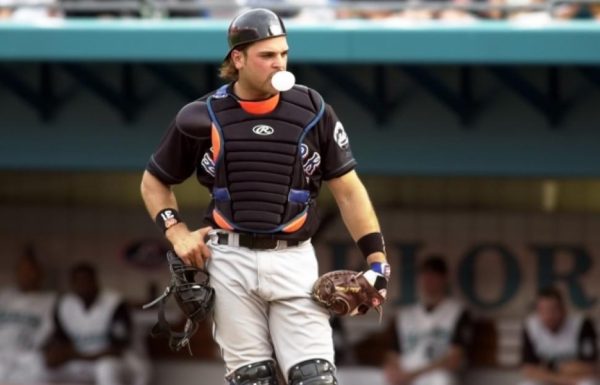
When the pitcher is out of the game, I’m still throwing the ball back to the other pitchers, so my arm strength started deteriorating rather rapidly in my thirties just from use. You only have so many bullets in the holster.
But getting back to my point, yes, throwing runners out is important and I think that’s something I was most scrutinized for or for not being able to do, especially later in my career.
As you mentioned, there are other things like blocking the plate, which is something I never shied away from, and I got racked good a couple of times; there are some great collisions online. I was never shying away from that. Catching popups, blocking balls in the dirt, just catching the ball or framing, whatever you want to call it. I was larger than most catchers, so guys liked to throw to me.
Coming up with a veteran staff when I came up with the Dodgers in ’93, I had Orel Hershiser, Kevin Gross, Tom Candiotti, Jim Gott, Roger McDowell, Steve Wilson, guys that were really demanding. I was blessed because they were very patient with me, but they were also very hard on me as well. That baptism in fire was great for my career as a catcher.
I also had this feeling, like if I grounded into a double play and I went out there with my head up my butt or just pouting, the pitcher was going to see that. I needed the pitcher to know that I was one hundred percent looking out for him and trying to get him through that game. Even with guys that I didn’t necessarily get along with all the time. I took active pride in that.
I knew I had some shortcomings defensively, but I always felt like there were other things I wanted to overcompensate for. I’m glad and blessed that these guys noticed that. It makes me feel really good.
MMO: The Mets were the first team to play a game in New York since the devastating terrorist attacks on September 11th. Your go-ahead, 2-run home run in the eighth against the Braves is a moment that will forever be etched in time. What memories do you have from that night, and how did you keep your composure during such an emotional time?
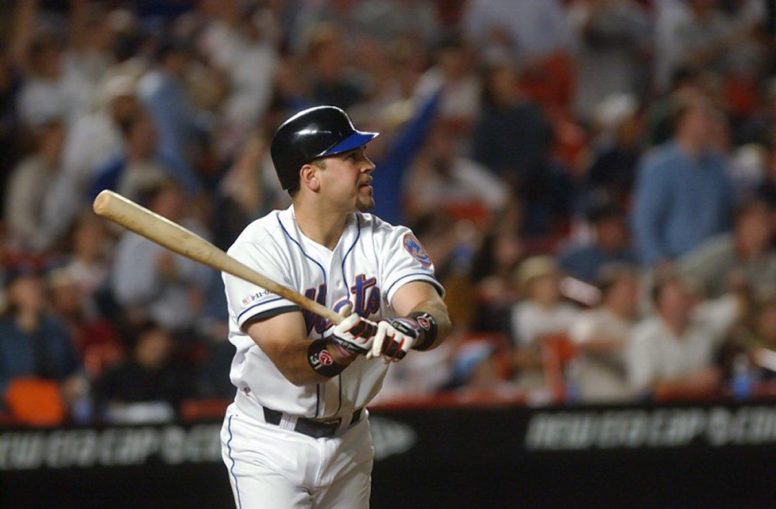
Piazza: I was raised in a very religious household, an Italian, Slovakian household. I still believe in prayer and I believe in mediation and believe me, it took all that feeling and ability to lift it up to a higher power and let go. We have a tendency in life to want to control every single minutia aspect of our lives, and there are some things we just can’t control.
Before that game and arriving to the stadium and going through all the feelings of that week of just wondering if we should be there, was very difficult emotionally. It’s hard enough to play a major league sport under normal circumstances, but under those circumstances, it was absolutely terrifying in a way because we’re not used to this emotional trauma.
To get out there and then start the program and hear the bagpipes, man, it was heart-wrenching. I didn’t even know if I could play that night. To just look up and pray and say God, please let me get through this night.
The game became secondary until the game started, which I thought was really cool. We all just wanted to get through the night, and I don’t mean rushing through, but we just wanted to get through without any further emotional stress or injury or whatnot. And remember, we were off for a week, so we were a little bit out of our playing shape or at least the intensity of the everyday experience.
There was a lot of anxiety. But in the end, as I’ve said, it was just blessed. God got me through it and I was in the right place at the right time. I just let it go and the moment happened.
I can only point it up to my faith, I really can. I don’t remember anything about it, it was almost like I was in a trance-like state and was just very blessed to come through at that moment.
I’m very honored that people still really enjoy it and I’ve always tried to treat that moment as a moment of respect. It’s very flattering and anybody that comes up to me when I’m in public, I’m always blessed and love to listen to people’s stories about that night as well.
MMO: Putting that momentous home run aside, which was bigger than baseball, is there a home run you hit with the Mets that still vividly sticks out in your mind to this day?
Piazza: I had some great moments. And that’s what I love about the Internet is you can go back and share in things.
The 200th home run against Billy Wagner in the Dome for me was great. A couple of home runs I hit down the stretch in ’98 because those home runs for me were sort of turning the crowd in my favor. The fans were finally realizing that they knew I was starting to rise to the occasion.
It’s funny, when I was playing well down the stretch in September, somebody put a sign up at Shea that said, “100 million is a bargain,” or something like that. At that point, I was like, This is good, I’m starting to make some progress here. Because everyone was like, is he worth the money? Is he not worth the money? These debates were going on ad nauseam for me every day. So, when someone put that sign up, I was like, This is good, this is good. [Laughs.]
The 2000 season and ’99 season, and hitting with John Olerud and Edgardo Alfonzo, and the great players I played with. I say this all the time but you can’t have personal success because baseball is such a team game; you can’t drive in yourself every time. If you hit 35 solo home runs, you have 35 RBIs. I needed guys on base. I played with the Roger Cedeño, Rickey Henderson, Olerud and Alfonzo, and these guys were out there all the time. They gave me those opportunities.
We had a lot of fun and had great characters on those teams. There wasn’t a day that I didn’t want to come to the ballpark because I just enjoyed laughing with these guys.
Special moments, special times and went by way too fast. I always love to go back. I miss it dearly.
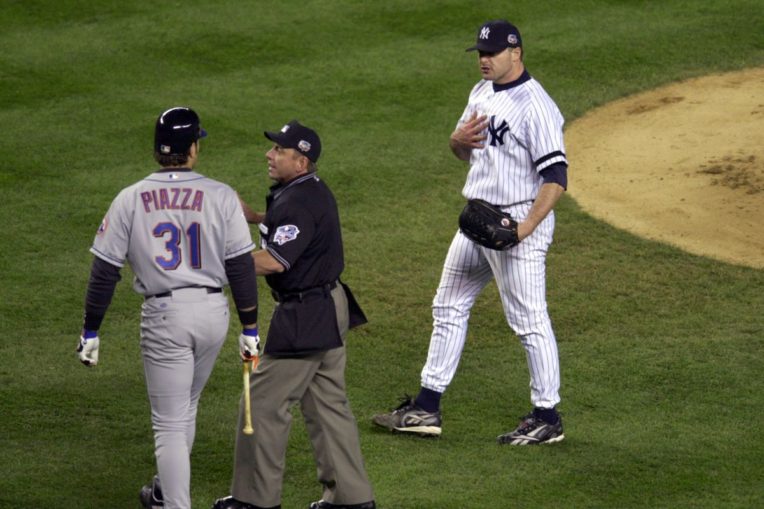
MMO: You certainly don’t have to answer this, but I’m curious if you and Roger Clemens ever spoke and tried to mend fences after all of the history you two had?
Piazza: I have no problem talking about it. I believe in forgiveness. If he ever wanted to reach out, I would talk to him. I have no problem. And if he doesn’t want to that’s fine, too. We’re not playing golf any time soon; we’re not buds or anything.
As I’ve said before, it was a difficult time in my life as well, that’s something you don’t ever take for granted. When you’re talking about not just injuring but even worse, it could’ve been a lot worse situation. It could’ve been a career-ending injury if he hit me in the eye. It’s something I’m very sensitive to and still am for that matter.
Time moves on and I’ve always been very philosophical about things like that. I think it was a challenge in my life and my career that I went through. I tried to handle it as well as I could. You’re never going to make everyone happy, that’s part of life too.
No, we’re not really friends. If he wanted to reach out, I’m not going to run away from anything. I’ve always been accountable, and I always felt like I wanted to be there. It is what it is but it’s fine. I don’t lose sleep over it.
The home run I hit off Jeff Nelson in that game (Game 2, 2000 World Series) was one of my most proud home runs to be honest with you. Think about the dichotomy there, the paradox there.
And putting all the incidents aside with Clemens, taking all that out it was really frustrating because I felt like we really had a shot to be a miracle team. We’ve could’ve been the second Miracle Mets. Even though they say it wasn’t the Yankees’ greatest team, that would’ve been a moment that we really wanted to give to the fans.
I always thank God for being there and having the opportunity. Even though we fell short we were there and that’s something I will always take away.
MMO: Al Leiter was convinced that if you guys took Game 1 you were winning the Series.
Piazza: I felt the same way. I don’t know how the analytics crowd talks about momentum, but I believe in momentum. And we had momentum. You could look at the Timo Pérez not scoring on Zeile’s hit, if the ball went out it would’ve been a home run.
We just kind of hit a wall and it was frustrating, no question about it. But it gave a great moment for the city and I’m always a glass half-full guy.
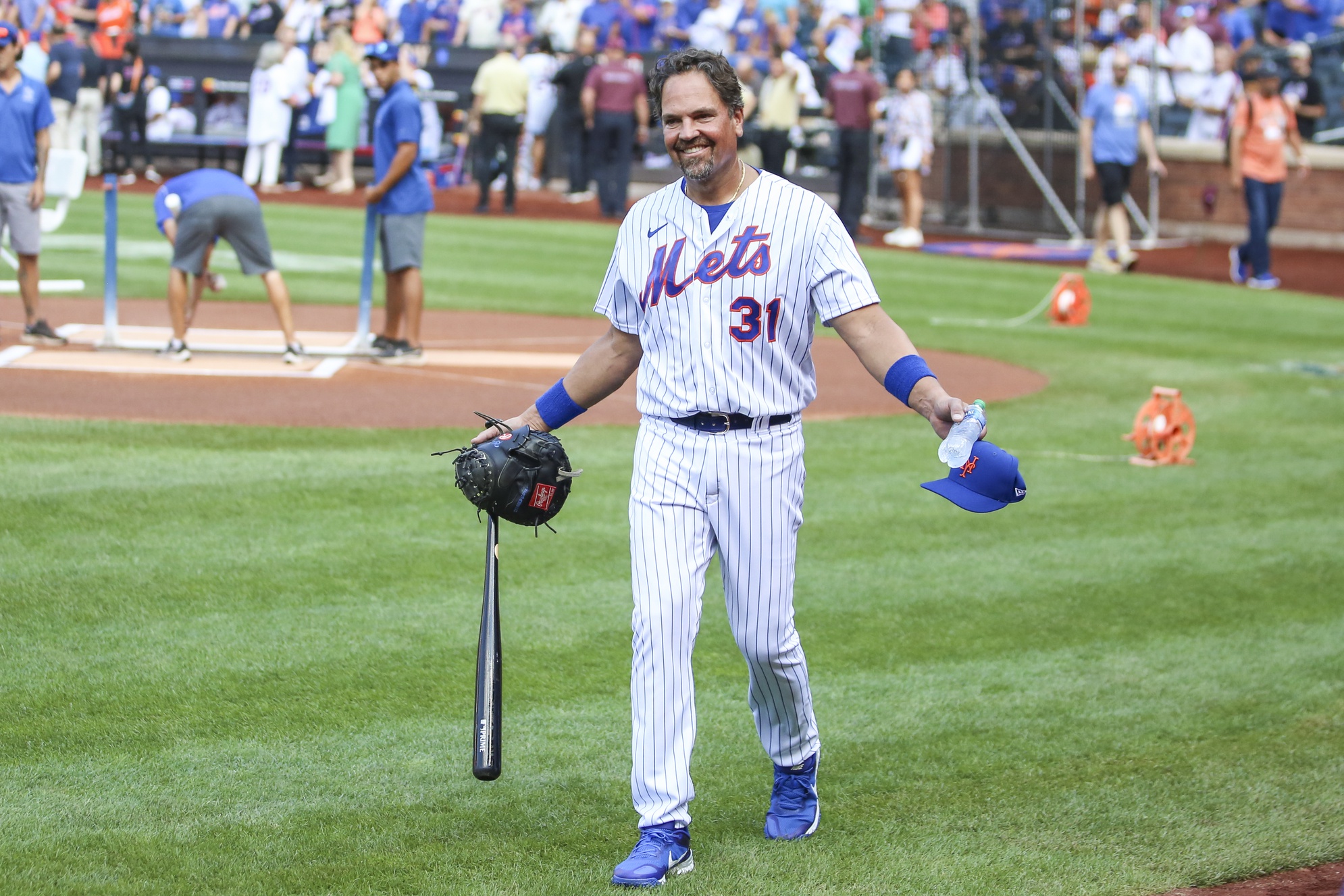
Aug 27, 2022; New York City, New York, USA; Former Major League catcher Mike Piazza at Old Timers Day at Citi Field. Mandatory Credit: Wendell Cruz-USA TODAY Sports
MMO: What did you think of Old Timers’ Day?
Piazza: I thought that was great! I’m involved with the alumni, and I love our history. We have some cool things coming up. Retiring Jerry Koosman’s number a few years ago was great, obviously Keith’s number was great last year, the Old Timers’ game was great.
I thought everybody enjoyed it. I didn’t realize and I do realize how out of shape we all are. [Laughs.] The funniest thing was after the end of two and a half innings everyone was like, “I’m not going back out there anymore. I’m done!” [Laughs.] Maybe next year we can have a little bit of a better system.
I made fun of Al Leiter because I was like, ‘Dude, you couldn’t even throw me a freaking strike!’ I think he was afraid of giving up a home run and then he couldn’t even throw a strike. Get a BP guy in there!
It was a great first re-engagement of the Old Timers’ Game. The guys really loved it, and the response was good so hopefully it’ll be an annual thing now and we can modify it or refine it a little bit to at least make it a little quicker maybe. But the fans didn’t care. It’s just something I hope becomes a tradition again.
MMO: Tell me about your involvement in the upcoming FOX reality series “Special Forces.” How did that come about and what can viewers expect from the series?
Piazza: Incredible experience, it changed my life in a way. It was really an incredible experience as far as the intensity and authenticity of the show. It was one hundred percent authentic, there weren’t any cuts or let’s do this again or craft services or smoothies or air conditioning. It was straight-out intense from day one until the end of the show.
I met some great people on that show and have all become very close. I just tell people to watch it! I think they’re going to enjoy it and think they’re going to laugh and cry.
There were some amazing moments and I was impressed with everybody. I was impressed with the people who weren’t professional athletes on the show, they showed a lot of guts and determination. It was a real rewarding experience in watching the human spirit.
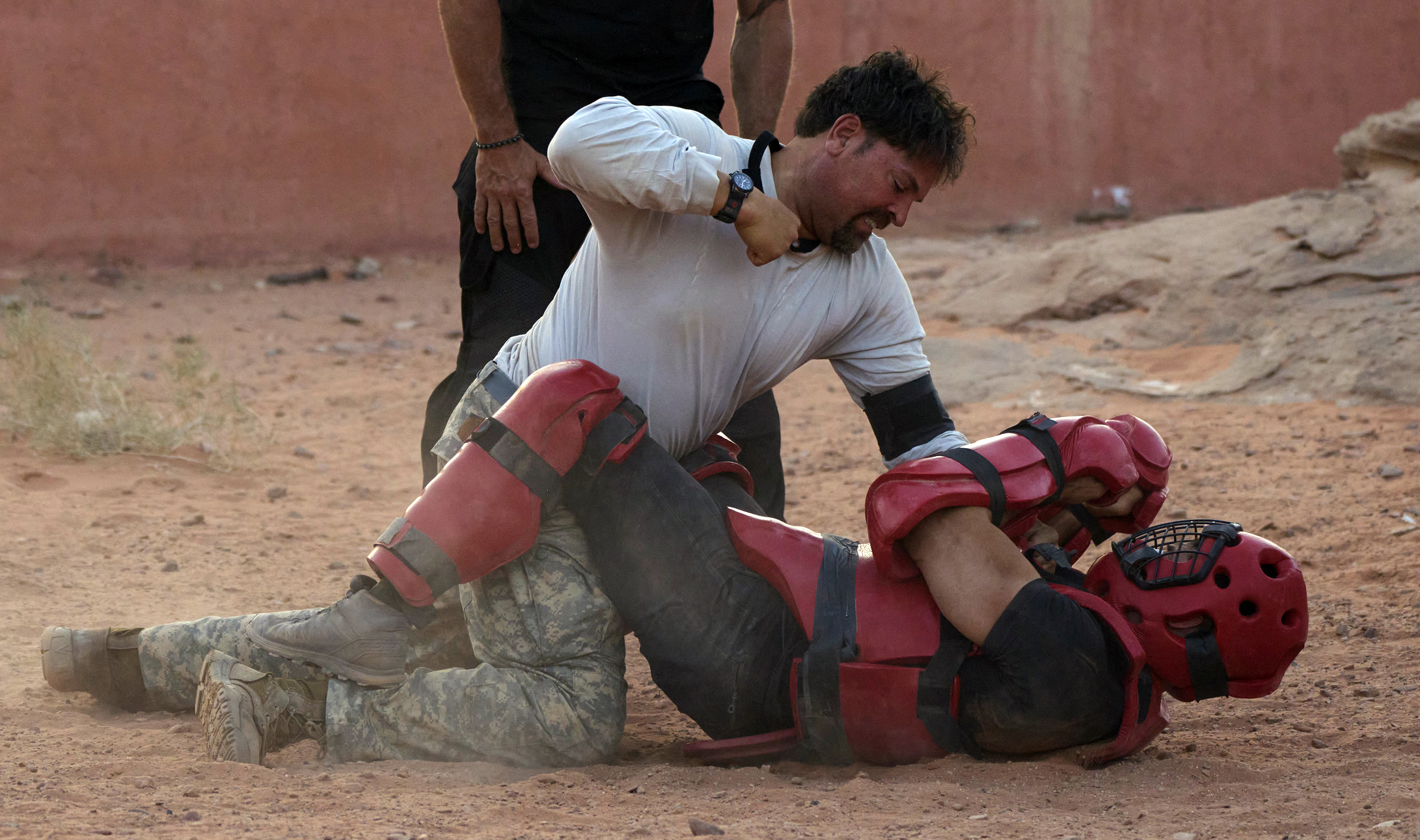
Pete Dadds / FOX
MMO: Did you undergo any special training prior to shooting?
Piazza: I work out still. I went to the gym this morning and I consider myself in decent shape. I’m not, by any means, an elite athlete or what I would consider in elite shape. But I did try to up the intensity a few months out going into that.
But there was nothing you could do to prepare for that! [Laughs.] Literally nothing unless you did the exact exercises.
It was hard; just running in sand with boots on was hard. Getting to the drills was hard. It was pretty intense, and I think people are going to be pretty surprised with the things we had to do, and the bravery and courage the people showed. I was very impressed.
MMO: You’re also managing Team Italy for the upcoming World Baseball Classic. How’s the preparation been? Do you have any aspirations to coach or manage in the majors one day?
Piazza: I really enjoy trying to grow the game worldwide. Anybody who knows me well knows that I’ve always enjoyed that tournament. And now that it’s coming back I think it’s great.
We have an incredible group of guys. Our philosophy on building this team was a little different than in years past; we may not have the most established major leaguers. We’re going to have guys that are close to the big leagues. I wanted a team that was a little younger, a little hungrier.
We have some really interesting guys. It’s a little fluid right now because we haven’t finalized the roster, but we’ve named the roster and I think it’s online. We’re going to have some Italian guys, we’re going to have some native Italian guys who we are very proud of playing over here in the minor leagues. I think it’s an amazing opportunity to grow the game.
As far as my philosophy of managing, I have the two-time Minor League Manager of the Year Blake Butera, who manages for the Tampa Rays. He’s more or less my co-manager because, quite honestly, I’ve been a little out of the game for a while, and the trends are different, the scouting is different, the analytics are different. I would be kind of crazy not to have an amazing staff. Chris Denorfia, who played for Team Italy, he’s the Double-A manager for the Rockies, he’s on my staff.
I really feel if I was going to do it (manage in the majors), it would definitely take a lot of commitment. I don’t think you can go into managing and take it in a way that’s not 100 percent authentic. I would have to go back and re-learn a lot of these trends or sort of get a crash course into how the game is different today. There are a lot of similarities, of course, it’s the same game, but I wouldn’t be able to do this if I didn’t have an incredible staff.
Blake is like my co-manager, he’s more or less going to be helping me tremendously, which I need. The tournament itself has a lot of interesting rules with pitching and pitch counts, so I need a lot of help with that.
I would say not right now, [but] I never say never. I don’t know if this experience turns out to be a positive experience. But it’s like building a coalition, if these guys say, hey, Mike, we’d love to work with you, we’ll take it from there.
We have a lot of work to do, we’re in a very tough bracket and the teams are very difficult. Cuba and Taipei are good, and the Netherlands, so we don’t have a cakewalk.
We have a good team; we’d love to get out of that bracket and get to Tokyo which would be a hell of an accomplishment for us. But first things first, we have to hopefully get out of that bracket.
We have our day off first, so we’re going to play four days in a row which is really difficult, whereas other teams have a day off in the middle. We’ve been given a really tough pool to ride. It’s going to be tough for us, we’ve got our hands full.
MMO: Thanks so much for some time today, Mike. It was great speaking with you.
Piazza: My pleasure, man.
Follow Mike Piazza on Twitter, @mikepiazza31


